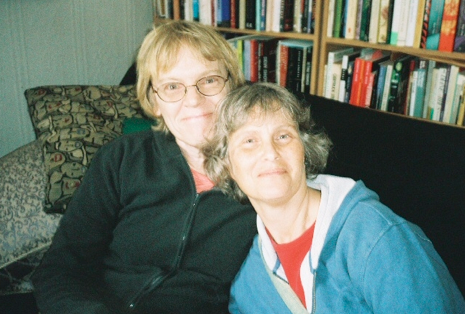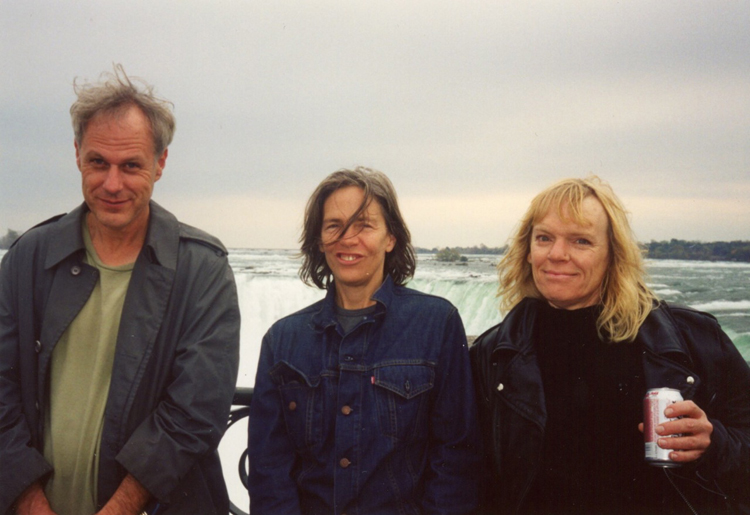I met kari edwards in Colorado, in Naropa, in the summer of 1999, a warm, summer afternoon, late enough so that the sun slanted into my eyes when I heard her call my name from afar, almost like putting your ear up to a conch shell, seemingly miles away. I had strayed rather far from the buildings of the school compound towards the river, and I saw kari make her way out of the sun towards me, parting the tall uncut brown grasses with her hands, perhaps not too gracefully but with enormous force and determination. It was nearly a Stanley meets Livingstone thing, we seemed so far from conventional civilization, or the urban in which I spend most of my time. I always come back to that first meeting, me standing in that field and she approaching me like Mrs. Moore in A Passage to India, or Cathy rushing headlong towards Heathcliff in the moor, or really in my head it’s more like the Kate Bush video of Wuthering Heights. Frances Blau was there too, trailing kari by six or seven yards, picking her way through the overgrown fields that are now, I think, practice fields for the University’s football team, rah rah rah. I’m not describing the actual plant life well but think of Christina writhing around on that grass in the Wyeth painting “Christina’s World.”
In the 1990s, we in the New Narrative movement were unsure whether it was all over or just about to begin, so we were tentative, more so than most writers: not paralyzed with shyness, far from it, indeed always ready to talk, so long as it was about something else. Part of it was the simple paralysis of human feeling, the novocaine-like prick of nothingness that comes down and shuts off like a bell jar, when emotion threatens to infect the subject of writing. I wanted my writing always to hover on the edge of hysteria. Like Bataille, Bruce said, but for me it was, embarrassingly, more often the dopey romantic chasms of the lyrics Hal David wrote for Burt Bacharach during their famous partnership.
Maybe I’ll be the things I dream, and not the things I see
Maybe I’ll get to change the world, before it changes me
And maybe my life will always be
Just as happy as it seems
Long ago tomorrow, long ago tomorrow—
Long ago tomorrow—In my dreams.
That kari on some level saw herself as one of us was an affirmation that the New Narrative cause wasn’t just about identity politics. The next time I saw her was at a setting equally sublime—Niagara Falls—and perhaps in consequence, when I think of her in retrospect, I always counterpoise the beauties of “nature” with the rough-hewn and very human determination to wrest happiness from nature’s maw. Kari never looked natural per se, her quizzical, sometimes breathless air, her mode in the French sense, prevented one from thinking of her as naive, or even young; and yet there was no one I knew with a deeper commitment to looking for something real in the heart of the façade. Maybe she would learn to face the truth, and like the truth she faced? (She was 45 when I first met her, and would be 55 today if she had lived.) We were at a conference in Buffalo called “Prose Acts,” itself a reference to the chemical tranquillizer that had given some of us some rest, and some of us only another fresh hell. “Prose Acts” was the brainchild of the music and culture writer Brandon Stosuy, then (autumn 2001) still a student at SUNY Buffalo.
It wasn’t strictly a conference for New Narrative, but rather on innovative prose, and thus Mary Gaitskill was there, and thus some leading New Narrative figures were not. Stosuy asked me to stage a play in which the participants could perform: This filled some of them with stage fright but in the end it was a grand success. We acted out The Vegetable Kingdom, a play I had written with the San Francisco-based artist and designer Rex Ray. Our two main plots were the struggle of a vegetarian-themed TV game show to stay alive in the face of falling market share and the real life antipathy of the musicians Yoko Ono and Linda McCartney, who become celebrity guests on the failing program to boost ratings. I played Linda, while Eileen Myles played Yoko, as we had done in the past; and other “Prose Acts” participants filled out the cast: Matthew Stadler was the host of Vegetable Kingdom and Dennis Cooper played Flem Fleming, his announcer. Lawrence Braithwaite was Sean Lennon, while Bob Glück played Mr. Mustard, Linda’s robot confidante. And so on. And kari edwards played Lee Meriwether, the well-preserved, composed hostess of a rival game show, Vegetable Password, using all her wiles to lure away Linda and Yoko from Vegetable Kingdom, and finally succeeding by lying her beautiful head off. Kari was one of those in panic. She couldn’t read off the script, she said, because of her dyslexia. “It doesn’t really matter about the lines,” I told her. “Just make up something. You’re Lee Meriwether, aren’t you?” Kari and I had been kids when Lee Meriwether was really famous, or almost famous, first as Miss America in a day when being Miss America really meant something—something bland, homogenized, gender-set, and yet by definition stone-cold appealing; and then she was Catwoman in the 1966 Batman movie. “I never liked her, not even her name,” kari noted. “Merry weather: what is that hinting at?” Maybe to us she represented a plastic mendacity, pretty on the outside, hollow at the center, and maybe the joke is on us today, as I see Lee Meriwether in old age winning raves for her acting as Volumnia and Mary Tyrone and Lady Macbeth and every other old lady part. In any case, kari played her most capably and carried off her lines with panache. “Just read them to me, and I will remember them in order—more or less,” she promised. “I will be Lee Meriwether and I will secure Linda and Yoko for my own, secure, well-ranked TV game show Vegetable Password.” “That’s the spirit, Lee Meriwether.” The students were taking us to see Niagara Falls the following morning. It was about five minutes before everyone had cell phones with cameras inside, so there wasn’t as much documentation as you’d think, of this memorable trip, but I had my old Olympus with me, and kari asked shyly if I would take pictures of her with Dennis and Eileen on either side, leaning on a stone balustrade with the vast panoply of the Canadian falls at their backs.
Today these photos feel so strange to me because, well, it wasn’t all that long ago really. Because both kari and Lawrence Braithwaite died so soon afterwards. The mists and water winds that obscure their features here and there seem less like conditions of place than of time; it is like memory obscuring right relations, and death removing from the mind’s eye the most precious parts, the very ones we would like most to hold on to. My student Matt Gordon was telling me today at lunch that wavelength is a technical term describing the duration between waves, and that both sound and color are discernible through wavelengths, and as he explained the color wheel to me, I kept thinking of kari and Lawrence brought together, from Boulder and Vancouver, respectively, for this one occasion, and then never to meet again, but to cheer myself up I imagine that they pursued a correspondence, “kept up” on both sides, for if anyone could have written a day in the life of p besides kari, it would have been Lawrence, and who else besides Lawrence Braithwaite could have written More at 7:30: Notes from New Palestine? Only kari edwards.
So beyond the sublime and beyond the organic formation of a community, a third element presents itself. The third element of my first meetings with kari was terror, for terror was in the background of each occasion. I had met kari in the wake of Matthew Shepard’s murder, when Scott Gibson, a young gay Boulder-based teacher and writer, conceived of a book made up of poems written to mark Shepard’s death, drawn largely from the experimental circles around Naropa (Blood and Tears). It was a thrilling book, made out of passion, and made out of a shared sense or resistance to violence against gay, lesbian, bisexual and transgender people everywhere. I know my own poem in that book has got to be one of the worst I ever wrote, and yet I’m proud of it and the reading, in that tent in Boulder, was super fun and yet reverberated with the power of fighting back. In Buffalo, it was a month after 9/11 and airports were still slowed down to molasses level with high security, and the anthrax scare was still on—do you remember? And for most of us there, it was still our first flight since those four planes went down, and all of us were looking at the seat ahead of us, at the emergency exits, at the stewardess’ steel carts, with suspicion and horror. Thus when kari read from a day in the life of p. in one of those cozy black boxes at Hallwalls in Buffalo, the room was moving with the intimacy of a foxhole. It was like all present were at war with something just on the other side of that ridge there, see it?

kari edwards and Fran Blau
I took this photo in my apartment in San Francisco, on Minna Street, a few days before kari’s sudden death. It was right after Thanksgiving in 2006. She had been diagnosed with an enlarged heart and an operation was in the cards immediately. Knowing that I had had a similar operation a few years before, Fran and kari called asking for reassurance. Was there any time I’d be free before the weekend? I snatched up my book and suggested, “As it happens, I’m free tomorrow evening.” The next evening promptly at seven, they rang the bell and I let them up, but when kari got to the top of the forty steps, I felt guilty and brainless. I should certainly have driven over to their place. I shouldn’t have let them make the long trip south of Market, switching buses, and I should never have let them climb those stairs! Kari stood there, panting, her chest moving in and out in great heaves. She couldn’t speak for some minutes. I had no idea the problem was so severe. At least after our talk, I had the grace to drive them home. They lived way out at La Playa, the little street just south of Great Highway out by the surfers and the Pacific.
And a few days later, as Fran did the laundry, kari died there, before the operation. Her heart just gave out I suppose. So terror ringed kari into my life and rang her out, but never really out. She is always there is some guise reminding me to do things better, to question authority, especially my own, since you cannot change a single life unless you can start with your own inside. Yeah, like that song “Man in the Mirror,” that Michael Jackson sang! That’s kari on the left and Fran Blau on the right.





Facebook Comments